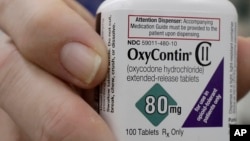A Kentucky appeals court says the secret testimony from a former president of one of the world’s largest manufacturers of dangerously addictive opioid painkillers must be released to the public.
A three-judge panel ruled Friday the deposition of Richard Sackler must be unsealed, along with about 17 million pages of other documents that were part of Kentucky’s complex lawsuit against OxyContin maker Purdue Pharma. The testimony could reveal more information about what company officials knew about the drug when they were selling it.
Purdue to appeal
The documents will not be released immediately. The appeals court upheld a lower court ruling, which ordered the release but said the documents would stay sealed as long as there is a pending court challenge. Friday, Purdue Pharma spokesman Robert Josephson said the company was disappointed with the decision and intends to appeal.
“The documents in question were never entered into evidence and did not play a role in any judicial decision. Under Kentucky law, such documents should remain private,” Josephson said.
The ruling is a victory for STAT, a national health publication owned by Boston Globe Media. Jon Fleischaker, an attorney for STAT, said it’s important for the public to know about the behavior of Purdue Pharma and to examine why the state settled the lawsuit.
“The public does not have to show a particular interest, a particular need to know. It’s got a right to know. Period. And that’s an important fact,” he said.
Wave of addiction
Sackler is a former president of Purdue Pharma and is a member of the family that still controls the privately held company. Purdue Pharma marketed OxyContin for its ability to slowly release its effects over a 12 hour period, which it claimed made it less addictive and safer for patients. But users discovered they could bypass the time-release qualities by crushing it.
The pill, along with other opioid-based painkillers, unleased a wave of addiction across Appalachia. Kentucky, West Virginia and Ohio now have among the highest overdose death rates in the country. In Kentucky, 1,565 people died from a drug overdose in 2017, a 40 percent increase in the past five years.
In 2007, Kentucky sued Purdue Pharma, claiming its deceptive marketing practices contributed to the opioid epidemic. The case settled in 2015 for $24 million. After the settlement, The Associated Press and STAT were among news outlets that sought copies of Sackler’s deposition through the state’s open records law. But the state denied those requests, citing an agreement with Purdue Pharma to seal all records in the case.
STAT sued. In 2016, a state judge ordered the documents unsealed. Lawyers for Purdue appealed that decision, arguing the only reason the company agreed to hand over information and offer Sackler’s testimony is because they were assured the documents would never be made public. They said releasing the documents would betray that trust and make it difficult for other civil lawsuits in the future.
Friday, the appeals court disagreed.
Property of the people
“Every claim of the Commonwealth against another, including the claim against Purdue, is the property of the people regarding which the public has a legitimate concern,” Judge Glenn E. Acree wrote for the court. “On that basis, the right of access supersedes even the right to privacy.”
OxyContin has been the world’s top-selling opioid painkiller, generating billions of dollars for Purdue Pharma. In February, the company announced it was eliminating half of its sales force and would no longer market the drug to doctors.






